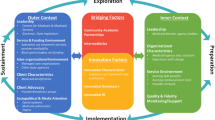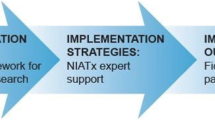Abstract
Despite significant effort devoted to developing and testing treatments for substance use disorders (SUD), most individuals who receive treatment in the United States (USA) do not receive evidence-based care. In this article, we summarize the emerging body of descriptive research that focuses on the question of why SUD treatment programs in the USA do not use evidence-based treatments (EBT) more and highlight initiatives that have shown promise as ways to facilitate their use. Using the Consolidated Framework for Implementation Research (CFIR) as a guide, we provide an overview of how various factors promote or inhibit the use of evidence-based treatments in SUD treatment settings in the USA. We then discuss how promising approaches to facilitate the use of EBT build upon many CFIR concepts and constructs. The article concludes with a discussion of the implications of the USA experience with EBT implementation for non-Western nations as they develop SUD services, highlighting three main lessons learned: (1) historical and cultural factors impact EBT implementation; (2) studies that test both clinical effectiveness and implementation outcomes can enhance implementation; and (3) multilevel implementation approaches may have greater impact than strategies that address just one level of change (e.g., individuals, organizations, systems).

Similar content being viewed by others
References
Alanis-Hirsch, K., Croff, R., Ford, J. H., Johnson, K., Chalk, M., Schmidt, L., & McCarty, D. (2016). Extended-release naltrexone: A qualitative study of barriers to routine use. Journal of Substance Abuse Treatment, 62, 68–73.
Aletraris, L., Shelton, J. S., & Roman, P. M. (2015). Counselor attitudes toward contingency management for substance use disorder: Effectiveness, acceptability, and endorsement of incentives for treatment attendance and abstinence. Journal of Substance Abuse Treatment, 57, 41–48.
Amodeo, M., Lundgren, L., Fernanda Beltrame, C., Chassler, D., Cohen, A., & D’Ippolito, M. (2013). Facilitating factors in implementing four evidence-based practices: Reports from addiction treatment staff. Substance Use & Misuse, 48(8), 600–611.
Bauer, M. S., Damschroder, L., Hagedorn, H., Smith, J., & Kilbourne, A. M. (2015). An introduction to implementation science for the non-specialist. BMC Psychology, 3, 32.
Becker, S. J., Squires, D. D., Strong, D. R., Barnett, N. P., Monti, P. M., & Petry, N. M. (2016). Training opioid addiction treatment providers to adopt contingency management: A prospective pilot trial of a comprehensive implementation science approach. Substance Abuse, 37(1), 134–140.
Bride, B. E., Abraham, A. J., & Roman, P. M. (2011). Organizational factors associated with the use of contingency management in publicly funded substance abuse treatment centers. Journal of Substance Abuse Treatment, 40(1), 87–94.
Bride, B. E., Kintzle, S., Abraham, A. J., & Roman, P. M. (2012). Counselor attitudes toward and use of evidence-based practices in private substance use disorder treatment centers: A comparison of social workers and non-social workers. Health & Social Work, 37(3), 135–145.
Carroll, K., & Onken, L. S. (2005). Behavioral therapies for drug abuse. American Journal of Psychiatry, 162(8), 1452–1460.
Condon, T. P., Miner, L. L., Balmer, C. W., & Pintello, D. (2008). Blending addiction research and practice: Strategies for technology transfer. Journal of Substance Abuse Treamtent, 35, 156–160.
Curran, G. M., Bauer, M., Mittman, B., Pyne, J. M., & Stetler, C. (2012). Effectiveness-implementation hybrid designs: Combining elements of clinical effectiveness and implementation research to enhance public health impact. Medical Care, 50(3), 217–226.
Damschroder, L. J., Aron, D. C., Keith, R. E., Kirsh, S. R., Alexander, J. A., & Lowery, J. C. (2009). Fostering implementation of health services research findings into practice: A consolidated framework for advancing implementation science. Implementation Science, 4, 50.
Damschroder, L. J., & Hagedorn, H. J. (2011). A guiding framework and approach for implementation research in substance use disorders treatment. Psychology of Addictive Behaviors, 225(2), 194–205.
Duncan, L. G., Mendoza, S., & Hansen, H. (2015). Buprenorphine maintenance for opioid dependence in public sector healthcare: Benefits and barriers. Journal of Addiction Medicine and Therapeutic Science, 1(2), 31–36.
Dutra, L., Stathopoulou, G., Basden, S. L., Leyro, T. M., Powers, M. B., & Otto, M. W. (2008). A meta-analytic review of psychosocial interventions for substance use disorders. The American Journal of Psychiatry, 165(2), 179–187.
Ferri, M., Amato L. & Davoli, M. (2006). Alcoholics Anonymous and other 12-step programmes for alcohol dependence. The Cochrane Library.
Finney, J. W., & Hagedorn, H. J. (2011). Introduction to a special section on implementing evidence-based interventions for substance use disorders. Psychology of Addictive Behaviors, 25(2), 191–193.
Flynn, P., Brown, M., & B.S. (2011). Implementation research: Issues and prospects. Addictive Behaviors, 36, 566–569.
Forman, R. F., Bovasso, G., & Woody, G. (2001). Staff beliefs about addiction treatment. Journal of Substance Abuse Treatment, 21(1), 1–9.
Fuller, B. E., Rieckmann, T., Nunes, E. V., Miller, M., Arfken, C., Edmunson, E., et al. (2007). Organizational readiness for change and opinions toward treatment innovations. Journal of Substance Abuse Treatment, 33, 183–192.
Garner, B. R. (2009). Research on the diffusion of evidence-based treatments within substance abuse treatment: A systematic review. Journal of Substance Abuse Treatment, 36(4), 376–399.
Guerrero, E. G., He, A., Kim, A., & Aarons, G. A. (2014). Organizational implementation of evidence-based substance abuse treatment in racial and ethnic minority communities. Administration and Policy in Mental Health, 41, 737–749.
Guerrero, E. G., Padwa, H., Fenwick, K., Harris, L. M., & Aarons, G. A. (2016). Identifying and ranking implicit leadership strategies to promote evidence-based practice implementation in addiction health services. Implementation Science, 11, 69.
Hartzler, B., Donovan, D. M., Tillotson, C. J., Mongoue-Tchokote, S., Doyle, S. R., & McCarty, D. (2012a). A multilevel approach to predicting community addiction treatment attitudes about contingency management. Journal of Substance Abuse Treatment, 42, 213–221.
Hartzler, B., Lash, S. J., & Roll, J. M. (2012b). Contingency management in substance abuse treatment: A structured review of the evidence for its transportability. Drug and Alcohol Dependence, 122, 1–10.
Henggeler, S. W., Chapman, J. E., Rowland, M. D., Halliday-Boykins, C. A., Randall, J., Shackelford, J., & Schoenwald, S. K. (2008). State-wide adoption and initial implementation of contingency management for substance-abusing adolescents. Journal of Consulting and Clinical Psychology, 76, 556–567.
Humphreys, K., & Frank, R. G. (2014). The affordable care act will revolutionize care for substance use disorders in the United States. Addiction, 109, 1057–1058.
Kirby, K. C., Benishek, L. A., Dugosh, K. L., & Kerwin, M. E. (2006). Substance abuse treatment providers’ beliefs and objections regarding contingency management: Implications for dissemination. Drug and Alcohol Dependence, 85(1), 19–27.
Knudsen, H. K., & Roman, P. M. (2014). Dissemination, adoption, and implementation of acamprosate for treating alcohol use disorders. Journal of Studies on Alcohol and Drugs, 75, 467–475.
Knudsen, H. K., & Roman, P. M. (2016). The diffusion of acamprosate for the treatment of alcohol use disorder: Results from a national longitudinal study. Journal of Substance Abuse Treatment, 62, 62–67.
Lehman, W. E. K., Simpson, D. D., Knight, D. K., & Flynn, P. M. (2011). Integration of treatment innovation planning and implementation: Strategic process models and organizational challenges. Psychology of Addictive Behaviors, 25(2), 252–261.
Ling, W., Amass, L., Shoptaw, S., Annon, J. J., Hillhouse, M., Babcock, D., & Ziedonis, D. (2005). A multicenter randomized trial of buprenorphine–naloxone versus clonidine for opioid, detoxification: Findings from the National Institute on Drug Abuse clinical trials network. Addiction, 100(8), 1090–1100.
Martino, S., Brigham, G. S., Higgins, C., et al. (2010). Partnerships and pathways of dissemination: The NIDA-SAMHSA blending initiative in the clinical trials network. Journal of Substance Abuse Treatment., 38(S1), S31–S43.
McCambridge, J., Witton, J., & Elbourne, D. R. (2014). Systematic review of the Hawthorne effect: New concepts are needed to study research participation effects. Journal of Clinical Epidemiology, 67(3), 267–277.
Miller, W. R., Sorenson, J. L., Selzer, J. A., & Bingham, G. S. (2006). Disseminating evidence-based practices in substance abuse treatment: A review with suggestions. Journal of Substance Abuse Treatment, 31(1), 25–39.
Molfenter, T. (2014). Addiction treatment centers’ progress in preparing for health care reform. Journal of Substance Abuse Treatment, 46(2), 158–164.
Molfenter, T., McCarty, D., Capoccia, V., & Gustafson, D. (2013). Development of a multilevel framework to increase use of targeted evidence-based practices in addiction treatment clinics. Public Health Frontier, 2(1), 11.
Morgenstern, J. (2000). Effective technology transfer in alcoholism treatment. Substance Use & Misuse, 35, 1659–1678.
National Center on Addiction and Substance Abuse. (2012). Addiction medicine: Closing the gap between science and practice. New York: The Author.
O'Malley, S. S., Garbutt, J. C., Gastfriend, D. R., Dong, Q., & Kranzler, H. R. (2007). Efficacy of extended-release naltrexone in alcohol-dependent patients who are abstinent before treatment. Journal of Clinical Psychopharmacology, 27(5), 507–512.
Pating, D. R., Miller, M. M., Goplerud, E., Martin, J., & Ziedonis, D. M. (2012). New systems of care for substance use disorders: Treatment, finance, and technology under health care reform. Psychiatric Clinics of North America, 35(2), 327–356.
Prendergast, M. L., Podus, D., Chang, E., & Urada, D. (2002). The effectiveness of drug abuse treatment: A meta-analysis of comparison group studies. Drug and Alcohol Dependence, 67(1), 53–72.
Proctor, E. K., Landsverk, J., Aarons, G., Chambers, D., Glisson, C., & Mittman, B. (2009). Implementation research in mental health services: An emerging science with conceptual, methodological, and training challenges. Administration and Policy in Mental Health, 36, 24–34.
Rawson, R. A., Rieckmann, T., & Gust, S. W. (2014). Addiction science: A rationale and tools for a public health response to drug use. Public Health Reviews, 35(2).
Rieckmann, T. R., Kovas, A. E., Cassidy, E. F., & McCarty, D. (2011). Employing policy and purchasing levers to increase the use of evidence-based practices in community-based substance abuse treatment settings: Reports from single state authorities. Evaluation and Program Planning, 34, 366–374.
Roman, P. M., Abraham, A. J., & Knudsen, H. K. (2011). Using medication-assisted treatment for substance use disorders: Evidence of barriers and facilitators of implementation. Addictive Behaviors, 36(6), 584–589.
Roy, A. K., & Miller, M. M. (2012). The medicalization of addiction treatment professionals. Journal of Psychoactive Drugs, 44(2), 107–118.
Saunders, E. C., & Kim, E. (2013). Substance abuse treatment implementation research. Journal of Substance Abuse Treatment, 44(1), 1–3.
Simpson, D. D., & Flynn, P. M. (2007). Moving innovations into treatment: A stage-based approach to program change. Journal of Substance Abuse Treatment, 33(2), 111–120.
Simpson, D. D., Joe, G. W., & Rowan-Szal, G. A. (2007). Linking the elements of change: Program and client responses to innovation. Journal of Substance Abuse Treatment, 33, 201–209.
Smith, B. D., & Manfredo, I. T. (2011). Frontline counselors in organizational contexts: a study of treatment practices in community settings. Journal of Substance Abuse Treatment, 41(2), 124–136.
Squires, D. D., Gumbley, S. J., & Storti, S. A. (2008). Training substance abuse treatment organizations to adopt evidence-based practices: The addiction technology transfer Center of new England Science to service laboratory. Journal of Substance Abuse Treatment, 34, 293–301.
Stein, B. D., Gordon, A. J., Dick, A. W., Burns, R. M., Pacula, R. L., Farmer, C. M., et al. (2015). Supply of buprenorphine waivered physicians: The influence of state policies. Journal of Substance Abuse Treatment, 48, 104–111.
White, W. L. (1998). Slaying the dragon: The history of addiction treatment and recovery in America. Bloomington, IL: Lighthouse Training Institute.
Author information
Authors and Affiliations
Corresponding author
Rights and permissions
About this article
Cite this article
Padwa, H., Kaplan, C.D. Translating Science to Practice: Lessons Learned Implementing Evidence-Based Treatments in US Substance Use Disorder Treatment Programs. Eur J Crim Policy Res 24, 171–182 (2018). https://doi.org/10.1007/s10610-017-9360-3
Published:
Issue Date:
DOI: https://doi.org/10.1007/s10610-017-9360-3




